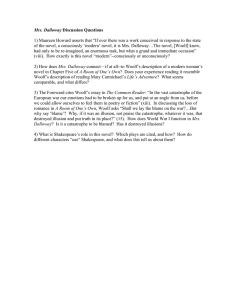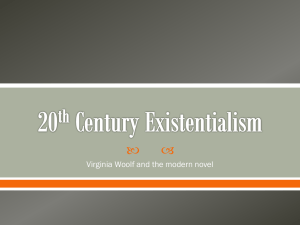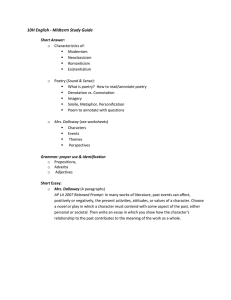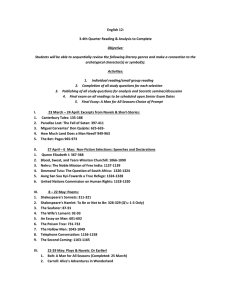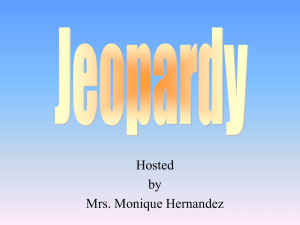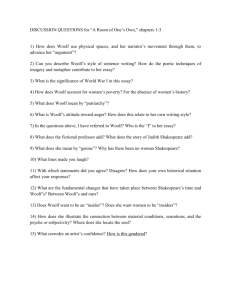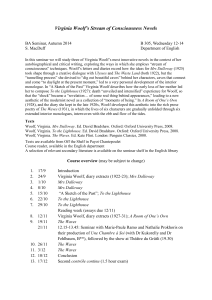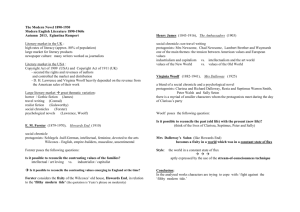Document 13549189
advertisement
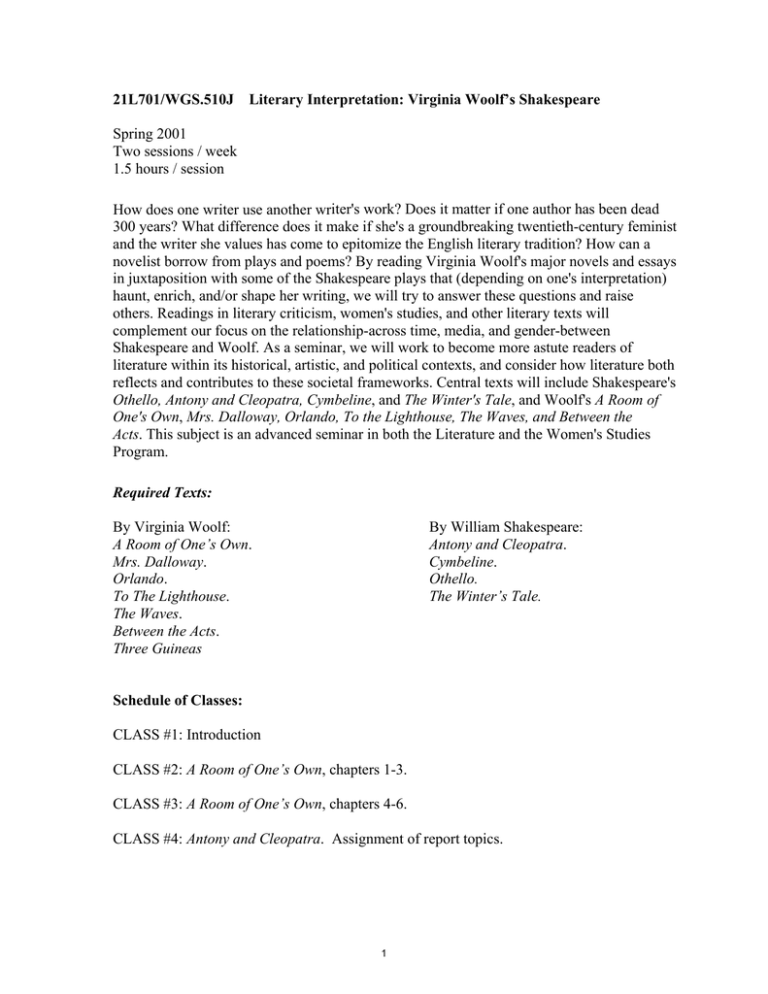
21L701/WGS.510J Literary Interpretation: Virginia Woolf’s Shakespeare Spring 2001 Two sessions / week 1.5 hours / session How does one writer use another writer's work? Does it matter if one author has been dead 300 years? What difference does it make if she's a groundbreaking twentieth-century feminist and the writer she values has come to epitomize the English literary tradition? How can a novelist borrow from plays and poems? By reading Virginia Woolf's major novels and essays in juxtaposition with some of the Shakespeare plays that (depending on one's interpretation) haunt, enrich, and/or shape her writing, we will try to answer these questions and raise others. Readings in literary criticism, women's studies, and other literary texts will complement our focus on the relationship-across time, media, and gender-between Shakespeare and Woolf. As a seminar, we will work to become more astute readers of literature within its historical, artistic, and political contexts, and consider how literature both reflects and contributes to these societal frameworks. Central texts will include Shakespeare's Othello, Antony and Cleopatra, Cymbeline, and The Winter's Tale, and Woolf's A Room of One's Own, Mrs. Dalloway, Orlando, To the Lighthouse, The Waves, and Between the Acts. This subject is an advanced seminar in both the Literature and the Women's Studies Program. Required Texts: By Virginia Woolf: A Room of One’s Own. Mrs. Dalloway. Orlando. To The Lighthouse. The Waves. Between the Acts. Three Guineas By William Shakespeare: Antony and Cleopatra. Cymbeline. Othello. The Winter’s Tale. Schedule of Classes: CLASS #1: Introduction CLASS #2: A Room of One’s Own, chapters 1-3. CLASS #3: A Room of One’s Own, chapters 4-6. CLASS #4: Antony and Cleopatra. Assignment of report topics. 1 CLASS #5: Discussion of the use of other texts in Room, including Antony and Cleopatra and possible reports on some of the following: As You Like It; Aphra Behn’s poems and The Rover; Jane Austen’s Pride and Prejudice; Charlotte Bronte’s Jane Eyre; and poems by Christina Rosetti and Alfred Lord Tennyson. CLASS #6: Hand in your 5-pp. essay, appraising Woolf’s use of another literary text in Room. (In the instructor’s mailbox) CLASS #7: Mrs. Dalloway. CLASS #8: Mrs. Dalloway. Possible reports on WWI poets, including Wilfred Owen (“Mental Cases,” “Dulce et Decorum est,” “Strange Meeting”) and selections by Siegfried Sassoon and Rupert Brooke. Possible reports on Elaine Scarry, The Body in Pain pp. 3-23 and skim 60-157; “Living in a War Zone: An Introduction to Virginia Woolf as a War Novelist” by Mark Hussey, and “The Female Victims of War in Mrs. Dalloway” by Masami Usui. (both in Virginia Woolf and War). CLASS #9: Cymbeline. Film screening of Mrs. Dalloway. (One day after CLASS #9) CLASS #10: Mrs. Dalloway and Cymbeline. 2-pp. response essay on some aspect of their relationship. Report on “Virginia Woolf as Shakespeare’s Sister: Chapters in a Woman Writer’s Autobiography,” by Christine Froula (in Women’s Re-visions of Shakespeare, Marianne Novy, ed.): 123-142. CLASS #11: Orlando, chapters 1-3. CLASS #12: Orlando and Othello. 2-pp. response essay on some aspect of their relationship. Report on Sir Thomas Browne, “Hydrotaphia.” Reports on Dympna Callaghan, “ ‘Othello was a White Man’: properties of race on Shakespeare’s stage” (in Alternative Shakespeares vol. 2, ed. Terence Hawkes): 192-215; Barbara Smith “Racism and Women’s Studies” “Healing the Great Divide” (in The Truth that never Hurts), and/or Toni Morrison, Playing in the Dark. CLASS #13: Orlando, chapters 4-6. Video screening of Orlando. CLASS #14: Orlando. Reports on selected poems by Alexander Pope, selected essays by Dr. Johnson. CLASS #15: To the Lighthouse, “The Window.” CLASS #16: To the Lighthouse, “Time Passes.” Selected Shakespeare sonnets. 2 Report on Eve Sedgwick’s Between Men, introduction and discussion of Shakespeare’s sonnets. CLASS #17: To the Lighthouse, “The Lighthouse.” 2-pp. response essay. CLASS #18: The Winter’s Tale and To the Lighthouse. Reports on Adrienne Rich, “The Domestication of Motherhood” (110-127), “Mother and Son, Woman and Man” (186-217), “Motherhood and Daughterhood” (218-255) Of Woman Born; “Compulsory Heterosexuality and Lesbian Existence” (23-75) in Blood, Bread, and Poetry. CLASS #19: Research day: work in library. CLASS #20: The Waves. CLASS #21: The Waves. Reports on Keats, selected poems and letters; Coleridge, essays on Shakespeare. Report on “Writing the Body: Toward an Understanding of l’Écriture féminine,” by Ann Rosalind Jones (in The New Feminist Criticism, ed. Elaine Showalter): 361-377. CLASS #22: The Waves. CLASS #23: Three Guineas. CLASS #24: Between the Acts. CLASS #25: Between the Acts. 15 pp. paper due: include a research component, as well as your own analysis. CLASS #26: Between the Acts. Student paper reports. CLASS #27: Back to A Room. Student paper reports. 2-pp. response. n.b.: The list of secondary reading for reports is tentative, and may vary depending on seminar size and availability of texts. Requirements: This seminar will rely on lively interchange; therefore attendance and full participation are required. This means having read the novels, plays, and critical selections carefully and on time, having some specific responses to them that you can share, and being sufficiently alert to join in an animated conversation. I will ask you to give a brief (five-minute) report on a literary text pertinent to Woolf’s work. You will also report on one of the critical essays, summarizing the argument and evaluating its applicability to the literary work we are studying. After I lead the discussion of Mrs. Dalloway, you will help lead the discussion of 3 one of the remaining novels; this will include preparing a list of questions to be handed out to each member of the class. A variety of written assignments will allow you to respond to our topic in different ways. Four short (2-pp.) response essays allow you to focus on a specific aspect of the works under discussion in a thoughtful way. Because they are designed to prompt substantial conversation in class, their effectiveness diminishes if they are not ready before we talk. Therefore, except in very special circumstances (arranged with me), response papers will not be accepted after the assigned date. A 5-page essay will provide an opportunity for you to focus in greater depth upon a particular text and Woolf’s representation of it in A Room of One’s Own. A longer essay (15 pages) will allow you to reflect upon a topic of particular interest to you during the semester. All written work should be typed and double-spaced, with standard margins. I will consider each of the requirements in determining your grade. If you cannot be in class or meet a deadline because of an emergency, please speak with me (in advance, if possible); otherwise, absences and late papers will adversely affect your grade. Approximate weighting: Class participation: 25% Reports on an outside text and a critical essay: 10% each Class leadership, with handout (list of discussion questions): 10% Four response papers: 10% Five-page essay: 10% Longer essay (15 pages): 25% I reserve the right to alter the weighting somewhat in exceptional circumstances; usually this works to your advantage. If written work is incomplete or attendance is infrequent, you will not pass the course. In addition to welcoming your participation in class, I encourage you to discuss your ideas and your writing with me during office hours, or at other times convenient for us both. 4 MIT OpenCourseWare http://ocw.mit.edu 21L.701 / WGS.510J Literary Interpretation: Virginia Woolf's Shakespeare Spring 2001 For information about citing these materials or our Terms of Use, visit: http://ocw.mit.edu/terms.
